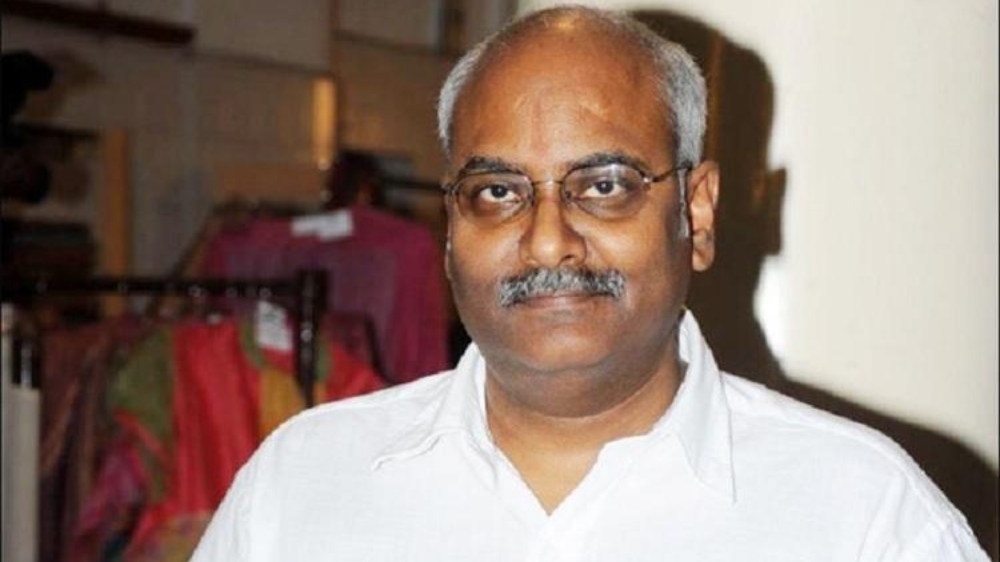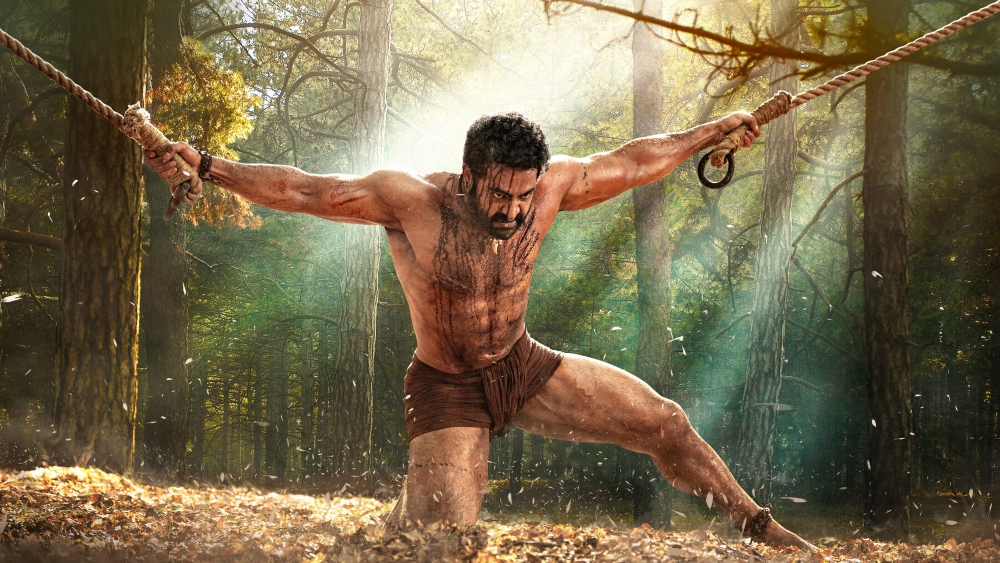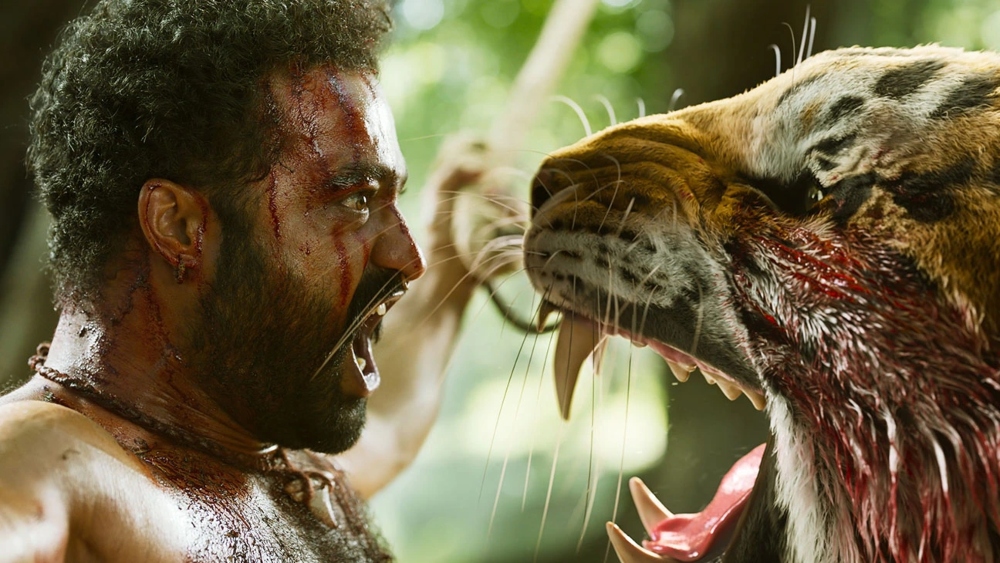Following his blockbuster Baahubali duology, acclaimed director/writer S.S. Rajamouli returned to the global spotlight last year with the epic action drama RRR, which since its release has captured the hearts and souls of audiences across the globe for a myriad of reasons, of course, but perhaps none bigger than the global phenomenon that is “Naatu Naatu.”
The high-energy piece, composed by the renowned M. M. Keeravani with lyrics from Chandrabose and playback singers Rahul Sipligunj and Kaala Bhairava providing the vocals, is a real moment of triumph in the film as heroes Ram and Bheem find themselves forced to defend themselves to a large group of hostile party guests. However, instead of resorting to violence, the duo embraces their Desi roots and launch into a show-stopping dance number that set the screen ablaze — and quickly became a viral sensation unlike any other.
Keeravani is Rajamouli’s elder cousin and has composed the soundtrack and score for all 12 of the director’s releases, including RRR. Throughout his career, he’s firmly established himself as one of India’s most decorated composers, with his work spanning through the Telugu, Tamil, and Hindi film industries. He was also the composer behind the Shah Rukh Khan-starrer Paheli, which was India’s official entry to the 79th Academy Awards.
RRR tells a fictitious story about two Indian revolutionaries in the 1920s who must team up to overcome impossible odds, as they begin their lifelong fight for India’s independence. The film boasts an all-star cast headlined by Tollywood superstars N. T. Rama Rao Jr. and Ram Charan, with Bollywood contemporaries Ajay Devgn and Alia Bhatt appearing in key supporting roles.
Last week, Keeravani and “Naatu Naatu” made history, becoming the first Indian song to win the Golden Globe for Best Original Song, and fresh off his win, Below the Line was able to sit down with Keeravani to get his immediate reaction. He also elaborates on how he initially conceptualized the song, the lengthy process behind composing music for the three-hour epic, and his working relationship with his brother S. S. Rajamouli.
Read on to learn more from the newly-minted Golden Globe winner:

Below the Line: Congratulations on your Golden Globes win yesterday, that was really awesome to see. Your song, “Naatu Naatu,” has become so insanely popular over this past year and has really made a huge impact on the world. How has it been for you just processing everything?
M. M. Keeravani: Yeah, I was overwhelmed with how fast the song had been gaining popularity, and going viral, and I’m very happy for the entire team who worked on this, and getting the Golden Globe yesterday. This song was produced [thanks to] a lot of effort from multiple people, the choreographer, the lyricist, myself on the tune, the programmers, many of them. To finally make it to this stage, where it’s getting global recognition now, I’m very, very happy for that. 30 days of man-hours were spent producing this song, apart from the shooting itself.
BTL: When you and S.S. Rajamouli were first discussing RRR, where did the concept of ‘Naatu Naatu’ come from?
Keeravani: ‘Naatu Naatu’ was intended to be a song of celebration, and a song of getting the spirits high. They have to be defensive at a party, where the Britishers are discriminating the heroes, and intimidating them with their hostility, so they responded by sharing fun, lots of fun. I mean, to the characters, to the other characters, to the entire crowd, as well as being fun for the use of the movie, like intended. So, it serves a purpose. That was the original intention behind creating ‘Naatu Naatu,’ to make everybody get into a celebratory mood.
BTL: “Naatu Naatu” is great on its own, but the choreography and performance really elevate everything. After finishing the song, what kind of discussions did you have with Rajamouli about how he was going to shoot it? Did you collaborate with the choreographer during shooting at all?
Keeravani: I haven’t collaborated with the choreographer, but I knew the requirements pretty well. I only coordinated with the director and choreographer beforehand, before the shooting, and they briefed me about the requirements for the choreographic steps involved. So, once the song is done, they took it to Ukraine for shooting, because the majority portion was shot in Ukraine, for the movie RRR. So, the song also happened there, the choreography, the shooting, the dance, everything. I couldn’t go to Ukraine to watch and monitor the process because I was confident enough about their competence, and I was busy elsewhere, but, at the end, when I watched the final cut of the song, I was very thrilled, and I was very happy feeling that my song is being promoted to a very good level and it is really justified, I mean, visuals-wise.
BTL: I know you and S.S. Rajamouli are family and are very close, and have worked together on multiple projects. What is your working relationship like? Do you each understand what the other wants pretty well?
Keeravani: Yeah, the difference between working with other directors and Rajamouli is Rajamouli is my cousin, he’s my brother, twelve years younger to me. So, he has access to knock on my restroom door whenever he wants to if an idea pops up in his mind, so he has an all-access pass into my bedroom, into my toilet everything. So, he comes up with an idea and I respond quickly, and that way, we save a lot of time. There is no latency in the process of commuting or communicating. So, that’s the major advantage, being available 24/7, that’s the physical advantage, and the other advantage is that the compatibility and wavelength because we’ve known each other for a long time. I’m 61, and he’s 48. So, the longest association in the family and, also in discussions about career, music, etc., but that has established a very good compatibility with us. So, I know what exactly he’s looking for, what is his taste, etc. We may differ in many other platforms, like he’s into sports. I’m very bad at that, I’m not the least bit interested in sports, so I don’t know the ABCs about sports, but he’s very much into sports. So, those are things that we differ on a lot. We have diversity, but we have strong compatibility, which makes my job much easier when coming to composing songs or score for his movies.
BTL: The entire soundtrack and score are both incredible. When you started to work on this movie, where did you begin? Was there a particular scene or character that got the ball rolling?
M. M. Keeravani: First, I composed specific themes for the heroes, there are two heroes in the movie, both are superstars in our country, so having that in my mind, I mean, having their following and their image, and, of course, also their characterizations in the movie. Having, in my mind, all these elements, I had to come up with specific individual themes for both of them. Also, there’s Ajay Devgn, who has a very clear and important role to play in the movie. All of these themes have to be defined and composed beforehand, so I did that, and, of course, once the movie is done, I watch the movie, I go scene-by-scene, I go by the emotions, what the story of the movie has to tell. So, that’s a constant process, emoting myself to the emotions and the scenes in the movie and translate them into musical notes, and most of the time, Rajamouli sits by my side, and he reacts to what I compose, and most of the time, he said it is fine, and maybe 10%, we have different opinions, which we settle after discussions and arguments.

BTL: RRR covers so many different genres in a three-hour time frame, from action and adventure to romance and drama. Was there a particular sequence that you found most difficult to compose? I believe I read that even “Naatu Naatu” had multiple variations.
Keeravani: ‘Naatu Naatu’ was never a difficult task, but the most difficult task I had to face and undertake is the introduction of Ram Charan’s character, who was a police officer. When he tries to capture a particular person under the orders from his commander, he jumps into a crowd of thousands of people. He dares to go among them, among the hostility and agitation and the revolution happening there. He tries to capture a single person, risking his own life, and he accomplishes the mission. There’s a lot of crowd noise of thousands of people yelling out, shouting out loud. So, what kind of music would be suitable to showcase then? What kind of music can I present and display? It’s very difficult. Everything was just noise, complete chaos everywhere. So, I tried to come up with a theme like the Commander’s command itself ringing in his head, that goes in like a DJ kind of a loop. I tried to come up with a different theme. Rajamouli liked it initially, but he wanted the crowd noise to dominate in some places, so, there were a lot of arguments between me and the director, but finally, I had to compromise a bit and he had to compromise a bit. I am happy with the final outcome of the particular scene. That scene had been very challenging for me.
BTL: Bheem and Ram are these instantly iconic characters. What kinds of sounds were you looking for to establish their themes? How did you want to differentiate their themes?
Keeravani: I resorted to lots of woodwinds and the brass section while composing for Ram Charan’s Ram theme. For the Bheem character, played by N.T.R., I resorted to percussions, riffs of tribal effects and all and human voices. For Ajay Devgn, lots of brass again, which we normally use when we’re trying to present patriotic feelings, musically. These are the specifically the instruments, but every theme is backed with rich strings and all, because when we present something on the silver screen, the sound should carry some body, and depth, and dynamics with everything. That’s what I did.

BTL: Ram Charan and N. T. Rama Rao Jr. are among these huge superstars, and you also once composed the soundtrack and score for Amol Palekar’s Paheli, which starred India’s biggest megastar Shah Rukh Khan. When you’re composing music for these icons, does it affect your approach at all? Do you even attempt to maybe cater a bit to their personalities or media image?
Keeravani: I don’t go by personalities much. I just consider them. I don’t ignore their personalities and image, but I mostly go by the character in the movie. What is the character saying? What are the traits? What was the texture of the character? How does he behave? So, those are the only things I consider, and I go by the story, I go by the characterizations. I rarely take the artist’s image into consideration. I go by the story, always.
BTL: For RRR, how long did it take you to compose the entire soundtrack and score?
Keeravani: The entire score took me about three-and-a-half months, I’d say about 100 days to complete. Then, we had six songs. The entire process of producing a song, composing, recording and getting the lyrics done, dubbing the voices and adding live instruments and mixing them down. This process took an average of 10 to 15 days, minimum 10 days for a song. That was another two months, with three months for the score, so totally about six months of work for me for this RRR movie, roughly. I never calculated the actual total, but I can say it took six months of man-hours for me.
BTL: I’m sure it’s still very early, but have you had any discussions with S.S. Rajamouli about a RRR sequel? Or about another future project?
Keeravani: Yeah, Part 2, I mean, we never know, it can be there, but right now, there’s not the priority because Rajamouli has to do a movie with Mahesh Babu, another superstar. So, he’s got commitments with him and some production house, that has to be addressed first, and, if at all, there is going to be any Part 2 for RRR, we cannot deny the possibility, but we never know. There is every possibility.
RRR is now streaming on Netflix and available to buy or rent on all major digital/VOD platforms.





